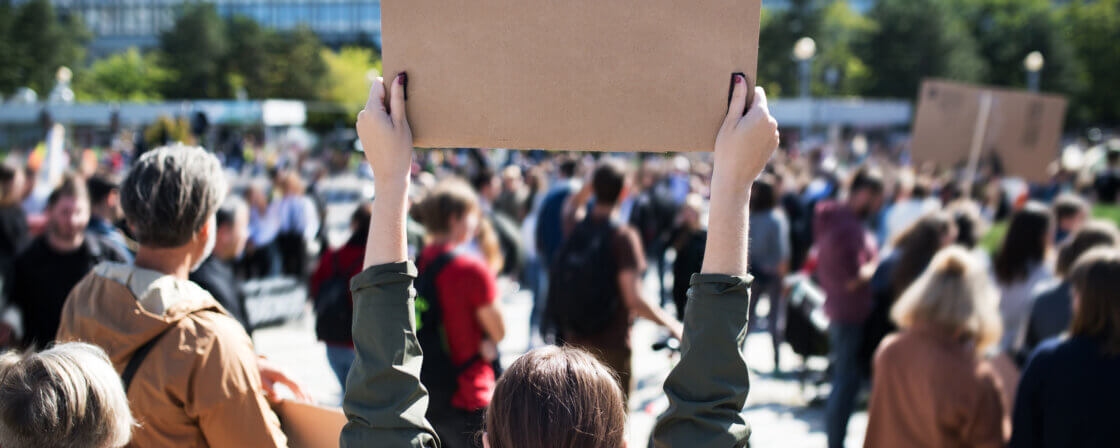What is a strike and a general strike
A strike is a collective and organised stoppage of work initiated by a group of workers as a form of protest against their employer. It is a temporary stoppage of work in order to put pressure on the employer to meet certain demands, such as asking for better wages, better working conditions or the elimination of some work-related problem. Strikes are usually organised by trade unions and are a common tool used by workers to negotiate with employers.
Many people also think of Štěpán Turk’s performance in the first ever series of Superstar in the Czech Republic when they hear the word strike. His hit “DJ Strike” ruled the star-studded airwaves back then. Even after more than twenty years, the DJ Strike is still a household name.
Compared to a regular strike, a general strike is a more extensive form of protest action with a broader thematic scope. A general strike involves workers from different sectors and industries in a region or even across the country collectively refusing to work. The aim is usually to halt economic activity and cause significant disruption to a particular sector in an attempt to put pressure on the government or to address wider social or political issues.
Tip for article
Tip: A strike is always political in a way. The podcast Rewrite History, which produced an episode called Strike is Always Political, knows this.
The difference thus lies not only in the number of workers involved, but also in the breadth of the overall focus of the strike. General strikes focus on addressing broader social issues such as political reform, social justice or economic policies. General strikes are usually coordinated efforts involving different trade unions and social movements working together for a common cause. These strikes can have a significant impact on the national economy and are often seen as a powerful means of expressing discontent and advocating for change.
Are you solving a similar problem?
Do you have a legal question about strikes or unions?
Email us and you will have a response from one of our attorneys within 48 hours.
I want legal advice
- When you order, you know what you will get and how much it will cost.
- We handle everything online or in person at one of our 6 offices.
- We handle 8 out of 10 requests within 2 working days.
- We have specialists for every field of law.
Who strikes most often
The frequency and intensity of strikes can vary across sectors, regions and time periods. However, some industries or occupations have historically been more prone to strikes due to factors such as poor working conditions and low wages. In the past, this was particularly the case for factory workers. Today, it is more likely to be in the transport sector, teachers, doctors and other medical staff. In the past, we can also see several student strikes. The speciality today is student strikes for the climate.
As far as the most striking countries are concerned, France is leading the way. France has a history of many significant strikes. Thus, we can mention, for example, the events of May 1968, involving large-scale student and worker protests; the 1986 railway strikes against proposed reforms; the 1995 general strike, which was a successful protest against changes to social security and pensions; the 2006 youth protests leading to the withdrawal from the adoption of a labour contract that would have allowed the immediate unjustified dismissal of people under 26; and the 2018-2019 yellow vest movement, highlighting concerns about economic inequality and government policies. Also last year, protests were held in France, for the tenth time, over pension reforms.
Tip for article
Tip: Is your employee not following work procedures? Has he or she caused you damage and refuses to take responsibility for it? Or does he or she want to sue you wrongfully? We’ll assess your chances of success and take care of the best course of action to resolve workplace disputes.
Important historical bets
Historically, the Czech Republic and the world have seen a number of strikes. Some of them have significantly changed the whole society. Let’s take a look at the most important ones:
The Svárov strike
The Svárov strike took place on 31 March 1870 and was a strike by workers at the textile factory in Svárov. The workers were protesting against a 10% wage cut. The owner of the factory, Johann Liebieg, reacted by sending gendarmes and troops to the peacefully demonstrating workers. This action resulted in the deaths of six workers and a young boy who was hit by a stray bullet.
The Duchcov strike
The Duchcov strike took place on 4 February 1931. The strike was against wage cuts and rising unemployment, which was mainly due to the Great Depression. The strike was mainly attended by miners and workers. During the strike, the strikers clashed with the gendarmes, resulting in four fatalities.
The Great Bridge Strike
The Great Bridge Strike is the largest Czechoslovak strike that was not suppressed. It was a strike of miners from Most and partly from Ostrava and Kladno. It took place from 23 March to 19 April 1932 and was a reaction to the economic effects of the Great Depression. The strike was mainly against wage cuts and redundancies. The conditions of the striking miners were partially fulfilled. The Most strike can thus be considered a success.
General strike 1989
27. in November 1989, a two-hour general strike began in Czechoslovakia as part of the Velvet Revolution. The 1989 general strike involved workers from various industries, including transport, factories and offices, to demand political reforms and an end to the communist regime. This widespread support significantly weakened the position of the communist government, especially the broad participation of the workers on whom the communist regime relied.
As a result of the general strike and mounting public pressure, the Communist Party eventually gave in to the demands for change. The Communist Party leaders resigned, opening the way for the formation of a new democratic government.
The strikes today
Strikes do not avoid our country even today. Teachers are among the most frequently striking group. Particularly significant in this case is the teachers’ strike that took place on 6 November 2019. On that day, teachers struck for a pay rise by not coming to work. The strikes for the climate are also a symbol of our times. A specific case in our country was the high school strike for climate. The aim was to highlight the unsustainability and pollution of our planet.
But sometimes strikes can be a significant problem. In the Czech Republic, for example, a strike by doctors has been threatened for some time. The health system is overstretched, there is a shortage of staff, so doctors have to work overtime and their pay is often not commensurate with their commitment. A strike by doctors would thus be the result of this long-standing dissatisfaction.
General strike 2023
On 27 November 2023, a general strike took place in the Czech Republic, organised by trade unions to protest against government austerity measures and the approved consolidation package. This protest became one of the largest in the country’s modern history, with an estimated participation of up to one million people. The strike involved some 7213 schools, representing three quarters of all regional schools. Many schools cancelled classes or introduced alternative programmes. The unions also reported the participation of various companies, including the car manufacturer Skoda Auto, which halted production for two hours. The government, led by Prime Minister Petro Fiala, described the 2023 general strike as coercive and confrontational. The finance minister has expressed reluctance to back down from planned austerity measures. Following the teachers’ strike, the opposition called on the government to resign.
Tip for article
Tip: Is your employer committing an illegal act? Is your employer not complying with the Labour Code? Contact us. An affordable attorney is ready to protect your rights.
What strikes are good for
Strikers are sometimes looked down upon. But strikes have a meaning and an important role to play. What are they?
- Workers’ rights and fair wages: strikes are often used as a bargaining tool by workers to win higher wages, better working conditions and benefits. They can be seen as a way for workers to exercise their rights and push for fair treatment by their employers. In fact, strikes help to balance the power dynamics between employers and employees. When workers collectively withhold their labour, they put pressure on employers to address their concerns and create a fairer working environment.
- Social justice: where workers face unfair or unsafe working conditions, strikes can be a means of highlighting and correcting these problems. This then further contributes to the broader goals of social justice
Tip for article
Tip: Are you a movie fan? There have been a number of great films made about strikes and unions. A classic is Sergei Eisenstein’s 1925 film The Strike, which deals with a strike by workers against factory bosses in the run-up to the Bolshevik Revolution. If you prefer more recent films, then the 2014 film Pride, set during Margaret Thatcher’s tenure, is not to be missed.
- Political change: in some cases, general strikes are used as a form of political protest or resistance. For the wider population, they can be a means of expressing dissatisfaction with government policies or social problems.
- Historical impact: Throughout history, strikes have played a role in achieving significant social and labour reforms. They have contributed to the establishment of workers’ rights, the 8-hour workday and other labour standards that are now taken for granted in many societies.
Summary
A strike is a collective work stoppage, usually organized by a trade union, as a protest against employers or government policies. The aim is to achieve better working conditions, higher wages or solutions to wider social problems. A general strike is a broader form of protest that involves different sectors and can have a strong political and social impact. Strikes have historically been a key tool for winning workers’ rights, including changes in working conditions or social reforms. In the Czech Republic, strikes are often teachers’ strikes, doctors’ strikes, or strikes related to changes in government policies, such as the 2023 general strike against austerity. Strikes are important to ensure fair working conditions, social justice and can also serve to bring about political change.




